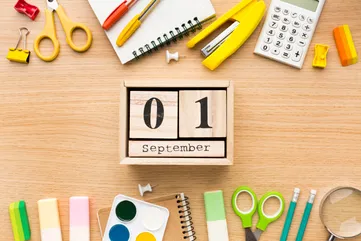Task Switching
Task switching is the cognitive ability to shift attention and effort from one activity to another, requiring mental flexibility and working memory to manage transitions effectively.
You're not alone
If homework takes forever because your teen switches between subjects every few minutes, or if they melt down when interrupted mid-task, you're seeing normal task switching challenges. Research shows task switching can reduce efficiency by up to 40 percent. Teens, especially those with ADHD, experience greater switching costs than adults. The constant task switching demanded by school schedules and homework is genuinely exhausting for developing brains.
What it looks like day to day
Student
Your teen starts math homework, switches to English after one problem, then to science, completing nothing fully.
Parent
You ask your teen to pause their game for dinner and witness a full meltdown over the "simple" transition.
Tiny steps to try
- 1
Transition rituals
Create consistent routines between tasks. Stand up, stretch, drink water before switching to signal the brain.
- 2
Task batching
Group similar tasks together. Do all math before switching to reading reduces cognitive load.
- 3
Switch warnings
Give five and two-minute warnings before required switches. Preparation reduces switching stress.
- 4
Attention residue clearing
After switching, spend 30 seconds mentally closing the previous task before starting the new one.
- 5
Strategic scheduling
Place hardest tasks when switching is minimal. Don't start complex work right before transitions.
Why task switching exhausts teen brains
Each task switch requires significant cognitive resources as the brain must disengage from one mental set and load another.
Task switching challenges:
• Mental residue from previous tasks
• Time lost in transition periods
• Increased errors after switching
• Cognitive fatigue from frequent switches
• Difficulty resuming interrupted tasks
• Emotional resistance to leaving preferred activities
Modern life demands constant task switching, overwhelming developing executive function systems.
References
Monsell, S. (2003). Task switching. Trends in Cognitive Sciences, 7(3), 134-140.
Ready to help your teen thrive?
Get personalized 1-on-1 coaching to build better habits and boost grades. Join 10,000+ families who trust Coachbit.
Frequently Asked Questions
Is multitasking the same as task switching?
True multitasking is mostly myth. What seems like multitasking is rapid task switching, which reduces performance on both tasks. The brain processes tasks sequentially, not simultaneously. Each switch has a cost. Help your teen focus on one task at a time, despite cultural pressure to multitask.
Why can my teen game for hours but can't switch between homework subjects?
Games provide continuous engagement without true task switching. Different game elements use similar cognitive resources. Homework subjects require loading entirely different mental frameworks. Also, games provide immediate rewards that ease transitions, while homework transitions lack motivating rewards. Add rewards between homework switches to ease transitions.
Related Terms
Attention Control
Attention control is your teen's ability to consciously direct their focus where it needs to go, maintain it despite distractions, and shift it purposefully when necessary.
Cognitive Flexibility
Cognitive flexibility is your teen's ability to switch mental gears, adapt to changes, and see situations from different perspectives without getting stuck.
Executive Function
Executive function is your brain's management system that helps teens plan, focus, remember instructions, and juggle multiple tasks successfully.
Shifting
Shifting is the cognitive ability to flexibly switch attention between tasks, adapt to new situations, and transition from one activity or mindset to another.
Transitions
Transitions are the periods of change between activities, environments, or life stages that require cognitive and emotional adjustment to shift focus and adapt to new demands.
Related Articles

3 Ways an Executive Functioning Coach Can Help Your Child
Discover why executive functioning skills are crucial for your child's success. Learn how an executive functioning coach can make a difference
Read article
Finding Order in the Chaos – Setting up Calendars for Kids
Creating a calendar and daily schedule for kids can be beneficial to manage school, homework, extracurriculars and hobbies. Color-coding and time-blocking are helpful tools for kids with ADHD.
Read article
